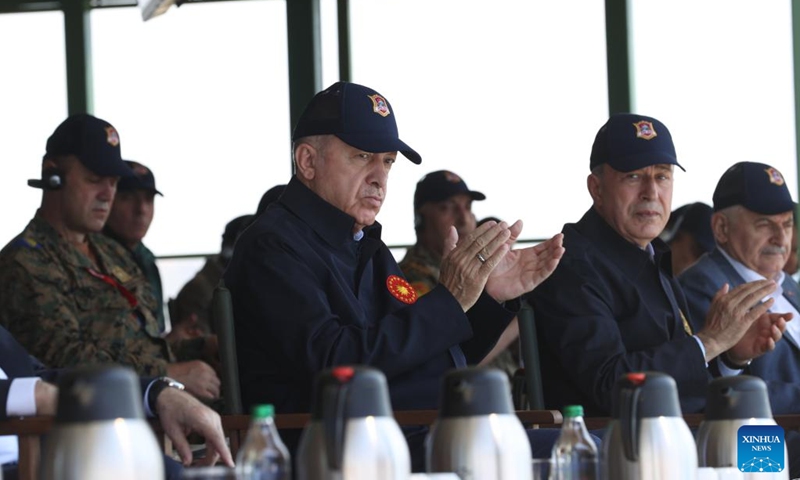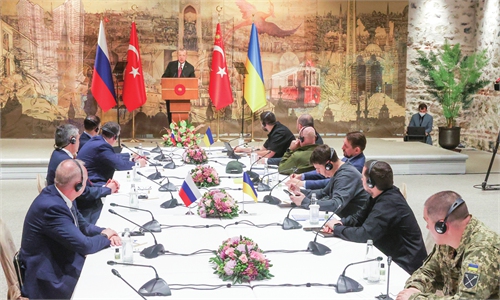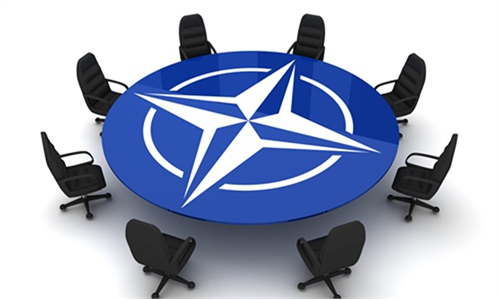More risks, conflicts ensue as NATO formally invites Finland, Sweden to join after Turkey lifts veto

Turkish President Recep Tayyip Erdogan (L, front) observes a military exercise in Izmir, Turkey, on June 9, 2022. Turkish President Recep Tayyip Erdogan observed the final day of a large-scale joint military exercise in Turkey's western Izmir province on Thursday.(Photo: Xinhua)
NATO formalized its invitation to Sweden and Finland to join the alliance on Wednesday after the last minute agreement was made between Turkey, Finland and Sweden to allow the two Nordic countries to join the bloc. Analysts said that the negotiations are a bargain for Turkey but will not bring security assurance to Finland and Sweden as NATO's expansion will bring more risks and conflicts to the region with less buffer zone with Russia.
NATO has formally and collectively decided to approve the countries' applications to join after Turkey dropped its objections Tuesday, paving the way for NATO's most consequential enlargement in decades, CNN reported.
The decision will now go to the 30 member states' parliaments and legislatures for final ratification. NATO's leaders said they expected the process to move quickly, allowing for an unprecedentedly swift accession, according to the report.
It came after NATO said on the eve of NATO's summit in Madrid in Spain on Tuesday that a trilateral deal had been reached between the leaders of Turkey, Finland and Sweden. NATO Secretary General Jens Stoltenberg was cited by media as saying that the three countries have signed a memorandum that addresses Turkey's concerns, the Guardian reported.
Turkey had opposed the two Nordic countries' bid to join NATO citing concerns of their lax approach toward groups that Turkey has deemed as security threats. For example, Turkey has accused Sweden for harboring members of the Kurdistan Workers Party (PKK) while Sweden denied the accusation.
Turkey's demands for NATO are clear, including requiring Finland and Sweden and other Western countries to stop supporting PKK, openly condemning it and deeming PKK and the People's Defense Units as "terrorist organizations"; and demanding the European Union to lift arms export restriction, Liu Zuokui, a research fellow on European studies at the Chinese Academy of Social Sciences (CASS), told the Global Times.
Turkey also urged the US to lift sanctions on it to buy S-400 missile defense systems from Russia and include Turkey in the US' sales list of F-35. Turkey also wants to buy new F-16 fighters to reinforce its air force, said Liu.
The expert noted that NATO cannot immediately agree with all of Turkey's demands as divergences on these issues have been accumulating for a long time. Turkey is dissatisfied with the unfair treatment from the West during its integration to the Western world.
"But as Turkey had dropped its opposition, it may reach consensus with NATO members and Finland and Sweden on the timetable to solve the problems on the list," Liu said, noting that the West and the US' recent efforts in coordinating and persuading Turkey also showcased Turkey's status and increasing influence.
According to the Turkish presidency statement released on Tuesday, a four-way agreement has been made between Turkey and Finland and Sweden and the two countries will have "full cooperation with Turkey in the fight against the PKK and its affiliates" and they would lift their restrictions on selling weapons to Turkey, according to Al Jazeera.
While NATO officials boasted the Tuesday agreement shows the alliance had resolved its differences, observers said that it has not - Turkey's open opposition is an epitome of complicated and jagged frictions within NATO and the recent incidents may also damage trust among NATO members and affect its decision-making system.
Liu pointed out that the US and West's consistent criticism of Turkey and their interference in Turkey's affairs by using human rights excuses have led to increased anti-West sentiment in the country. Turkey's relations with Russia not only bring it huge economic benefits but also geopolitical room to seek greater international influence especially after the Russia-Ukraine conflict.
Turkey's "balanced diplomacy" between the West and Russia and bargaining to seek its own interests may set an example to other NATO members, which may bring more difficulties for NATO to deal with internal frictions, Liu said.
The leader of the Liberal Democratic Party of Russia (LDPR) and Chairman of the State Duma Committee on International Affairs Leonid Slutsky was quoted by TASS as saying that Sweden and Finland joining NATO is their choice, but these Nordic nations must realize the consequences this will have on their ties with Russia.
Dmitry Medvedev, deputy chairman of the Russian Security Council, was also quoted by newspaper Argumenty i Fakty in an interview published Tuesday that Russia will station ballistic missiles and nuclear weapons on its border if Sweden and Finland are allowed to join NATO, and that Ukrainian membership of the military alliance could trigger World War III.
Liu noted that Finland and Sweden's joining NATO will allow NATO to fortify its eastern and northern flanks, making the buffer zone with Russia greatly shrink. And with more members in NATO, the risk of having conflicts with Russia has increased which may go against Finland's and Sweden's seeking security assurance.
Analysts also noted that the two Nordic countries may also soon join the Baltic countries - Estonia, Latvia and Lithuania--in worrying about NATO's "tripwire" approach since NATO's relatively small number of troops would see these countries overrun before NATO takes measures to assist after 180 days, according to media reports.
They noted that NATO attaches more importance to the interests of its 12 founding members and other countries either in the Baltic region or Nordic region may be sacrificed to protect the founding members in west Europe.


